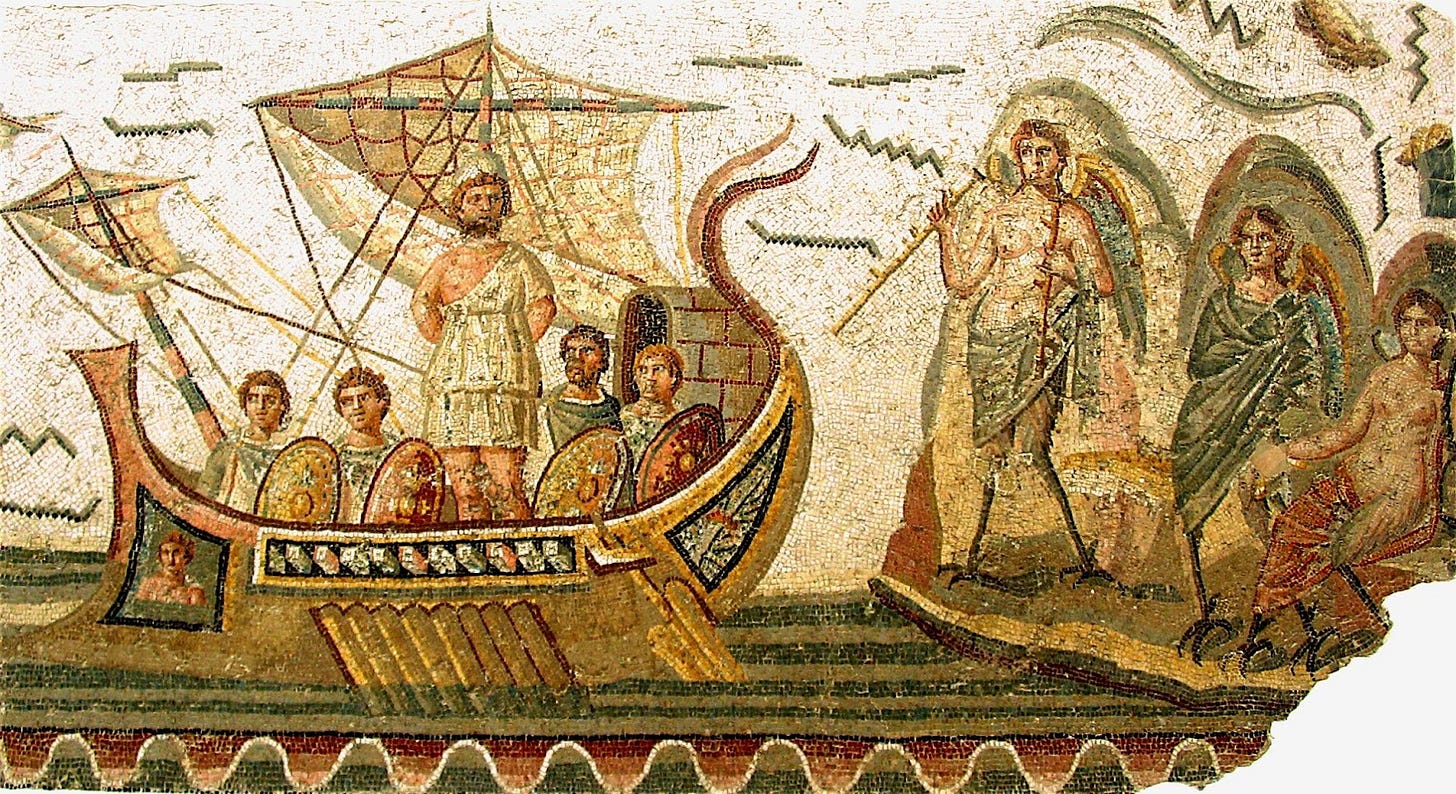How to Stop Making Mistakes You Really Want to Make
The Art of Lashing Yourself to the Mast
The Sirens sang seductively as Odysseus sailed past, but he didn’t go to them.
He couldn’t — he’d lashed himself to the mast of his ship.
Caught by the spell, he yanked at his bonds until his skin was bloody and raw. The beach before the sirens was strewn with wrecked galleys and “bone heaps of men now rotted away1,” a testament to the danger.
But Odysseus was blinded by the song. The beauty of the serenade lulled his faculties, deluding him. He screamed himself hoarse, begging his men to release him. But they didn’t. Odysseus had ordered them to ignore his pleas and put wax in their ears.
And so the ship sailed away from the rocky isle until the sound of the waves drowned out the enchanting song and Odysseus came to his senses.
Clever “man of twists and turns,” that Homer tells us he was, maybe he smiled. After all, he’d found an artificially-assisted way to do what wise people have attempted for millennia — to hold back from what seems good till they have a chance to examine it dispassionately.
Holding Back:
This holding back makes us aware of the subconscious delusions and half-heard inner discourse that rules us and often ruins our lives.
Some hide from the siren song— they’re monks and Cynics who withdraw from life’s pleasures and responsibilities to seek serenity. It’s a valid path, but not one that interests most people.
Others embrace pleasures and flee from pain, the shallow and oft-regretted life of hedonists.
But certain techniques allow us to hear life’s sirens without crashing ourselves into the rocks. There’s a path that winds between the renunciant and the enslaved, and we can find it.
How to Hold Back
“For nothing is as effective in creating greatness of mind as being able to examine methodically and truthfully everything that presents itself in life…”
— Marcus Aurelius, Meditations, 3.11.
There’s a process we observe:
We perceive a phenomenon
We automatically react to it.
If the process ended there our life would be a living hell of fleeing discomfort and sprinting toward temptations. We’d be slaves to processes outside our control.
Luckily, there’s another step: we assent to or withhold assent from our initial impressions, giving us space to say and do things more in line with our values.
The problem is that we often aren’t aware of this option. We assume our initial reactions — based on cultural programming, half-examined preferences, or addictions — are correct or inevitable. The impressions go unexamined, and we become slaves to them.
Ideally, we’d notice initial impressions and judge them on the spot. We might become aware via the negative emotion bundled with them — subtle or overwhelming tides of anxiety, fear, jealousy or anger stabbing at our awareness. When you feel strong emotions, it’s time to examine what they’re based on.
But what if we don’t notice? What if we’re so distracted, addicted, or overwhelmed that we’re being jerked around like a puppet?
Enter the Mast:
Writing is often frustrating. When I can’t find the right segue or turn of phrase, and vapid ideas clutter the page, something inside me pleads: “This isn’t working. Let’s go do fun things instead. Distract us from our failure!”
If I force myself to sit and work, answers present themselves. But what if my assent to escapism is so quick and unconsidered that I’m scrolling social media before I’ve made a conscious decision to abandon the project?
How many times have I found my phone in my hand, having never decided to pick it up? How many times have I noticed myself standing up from my desk, or browsing in the fridge, despite never actively deciding to do those things? Each time, I was carried along by an impression of what was good that my rational mind didn’t agree with.
It’s in times like these that I need a restraint. I need to be held back so I can consider the impressions I’m unthinkingly assenting to. What I need is a mast. I’ve found several that do wonders.
A Mast for the Internet:
Social media and doom scrolling are dopamine pleasure houses that addict us by finding all the right buttons to press.
You can unplug your router to escape, but we sometimes need internet connectivity to work. The Freedom app is great because you can set it to lock you out of all or parts of the internet as well as distracting applications on your phone and computer.
If I plan to do focused work in the morning I schedule it to turn on before I wake up and turn off when my schedule says it’s time for something else. I sometimes have it turn itself back on in the evening to ensure I don’t fill my free time with things that don’t align with my values.
The most interesting part of this “mast” is observing what a slave I am. The Stoic philosopher Epictetus was a literal slave for much of his life, but after being freed and taking up teaching he often called his privileged playboy students “slaves” because they unthinkingly took orders from their impressions.
On a bad day with Freedom on, I’ll watch myself compulsively open browser tabs to escape my discomfort, only to have nothing show up — I’m lashed to the mast. The only way out is through. I go back to work.
The more I’m forced to observe myself — like a moth beating itself against the glass, seeking the flame that will burn it — the more I stop trying to open browser tabs. I reassess. I’m disgusted by my complicity in my own enslavement. I do better.
The longer I’m tied to the mast, the less I need the mast.
Meditation: A Mast for Everything
Sometimes, the mast can’t be a solid restraint. A loose self-binding is better for general applications.
When we sit cross-legged on the ground, set a timer, and close our eyes, it’s hard not to learn lessons about impressions, impulses, and assenting
What time is it? I forgot to send that email. My leg is itchy. There’s tension.
Your mind presents ways to resolve it, but they’re not things you can assent to.
But we can watch and see how tension falls away naturally as we converse with ourselves. Meditation helps us unlearn the necessity of compulsive action. It trains us to hold back assent.
It’s amazing to meditate and then get on with life, only to find our supervision of impressions is way better. Our mind wheels and pleads and pulls, and we see what it’s doing. Instead of automatically assenting, we examine each impression on its merits.
Back to Square One:
If we then spend a few hours distracted, our improved supervisory ability diminishes, and we’re reminded of Epictetus’s warning to his students:
“When you let your attention slide for a bit, don’t think you will get back a grip on it whenever you wish—instead, bear in mind that because of today’s mistake everything that follows will be necessarily worse. . . . Is it possible to be free from error? Not by any means, but it is possible to be a person always stretching to avoid error. For we must be content to at least escape a few mistakes by never letting our attention slide2.”
And if we find ourselves making mistakes and giving assent to things we don’t agree with?
It’s time to grab the rope and return to the mast.
Epictetus, Discourses, 4.12.1




Great read. It’s wild how in meditation you can just observe your thoughts bouncing on autopilot and realize you’re not as in control as you thought.
Odysseus' journey can be seen as a metaphor for the souls progress towards wisdom. At a stage where we can still be distracted from our purpose in life, it can be necessary to tie ourselves to the mast - but that is not the ultimate solution. Our task is to find our purpose and to learn to stay focused.
"hurry to yourself. As you progress, strive above all to be consistent with yourself. If ever you want to find out whether anything has been achieved, observe whether your intentions are the same today as they were yesterday. A change of intention shows that the mind is at sea, drifting here and there as carried by the wind. A thing that is well grounded does not move about. That is how it is for the completely wise person, and also to some extent for the one who is making progress toward wisdom. What is the difference, then? The progressor moves, but does not shift position; he merely bobs in place. The wise person does not move at all".
- Seneca, Letters, 35.4.